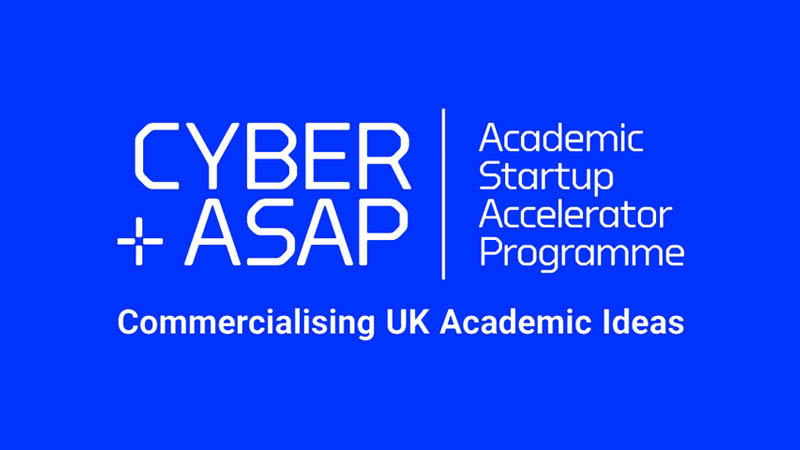Which of these 20 exciting Cyber Security Ideas will advance to Proof of Concept stage?

Cybersecurity is a key issue for us all. With daily reports in the news of hacks and security breaches, protecting our data, our devices, the services we access online have never been more important, nor more challenging. As these threats to cybersecurity constantly evolve, so the necessity grows for a pipeline of innovative ideas to expand capability and manage cyber risk. A mechanism whereby those ideas – many of which start life in academic labs – can find their way to market, is crucial.
Cyber Security Academic Startup Accelerator Programme (CyberASAP) was launched four years ago to do precisely this. Featured in this month’s UK Government Research & Development Roadmap (see page 31), CyberASAP has an important part to play as “the UK’s excellence in cybersecurity research provides an exciting foundation for new ideas to better secure the UK”. It is the only pre-seed accelerator programme in the Cyber Security ecosystem.
CyberASAP provides academic teams with a comprehensive programme of support to help them commercialise their ideas. Led by the KTN’s Emma Fadlon and Robin Kennedy – who have deep expertise in start-up/early-stage product commercialisation and cybersecurity respectively – the programme currently sees a cohort of 20 academic teams (selected from 28 chosen to start the programme back in April) coming to the end of the market validation stage.
The diverse range of cybersecurity ideas (see below) from this year’s cohort will be scrutinised this week by a panel of independent assessors who will decide which teams will progress to Phase 2 of CyberASAP to develop their Proof of Concept demonstrators.
Here we provide the University teams’ one-sentence descriptions of their cybersecurity idea – you can find their longer summaries here. Please contact Emma Fadlon or Robin Kennedy if you would like to find out more about any of these projects and/or be put in touch with the project teams.
Teams Completing Phase 1 of CyberASAP 2020/21 – full descriptions here.
University of:
Bournemouth – Authentibility Pass
Application for people with disabilities to communicate authentication/accessibility requirements to organisations.
Bristol – A Tamper Guard and Intrusion Monitor using Zenneck Electromagnetic Surface-waves
Making surfaces that identify, verify and protect themselves.
Cardiff – CyCIS
Advanced Cyber Threat Detection & Incident Impact Tool for Infrastructure Resilience.
Edinburgh Napier – Memcrypt
Memcrypt protects and recovers confidential data from ransomware attacks.
Essex – SenseiChain
Redefining the future of Blockchains through secure real-time data analytics.
Imperial College – Perfect Privacy Preservation as a Service
Unrivalled value from sensitive data silos with mathematically guaranteed privacy.
Imperial College – WhatML: Watermarking Machine Learning Models
WhatML protects the value and the intellectual property of machine learning models.
Kent – #ID Security of IoT
Secure Device Identity to power the future of the Internet of Things.
Lancaster – Developer Security Essentials
A non-profit helping consultants make the 400,000 UK developers better at security.
Leeds – Developing a Quantum Inspired Key Distribution
Enhanced Automatic Fraud Detection and Quantum Secure Transactional Platform to protect everyone.
Leeds – Artificial Behaviour-Based Authentication for IoT (ABBA-IoT)
Data tampering detection system for automotive sensors.
Liverpool – Flexible Querying of Encrypted Graph Databases
Query your graph data while keeping it encrypted with full user’s control.
London South Bank – Victory – Secure VNF Service Management in 5G using Blockchain
‘Victory’ provides a reliable and secure service management for Edge-Cloud resources.
Middlesex – Threat Hunting System Based on Linux Security Hardening and Mandatory Access Control Policies
A Security assessment tool for Linux systems based on the MITRE Framework.
Nottingham – AI-DRIVES – AI-Driven Secured Connected and Autonomous Vehicles
Connected vehicles will reduce 13% road accidents: But are they safe?
Plymouth – MaCRA (Software Tooling for Maritime Cyber Risk Assessment)
Dynamic, Multi-Dimensional Risk Assessment for Holistic Appraisal of Maritime Specific Operations.
Southampton – CyberHelper
CyberHelper is an innovative tool that efficiently runs your cyberattacks’ investigations.
Strathclyde – Lupovis: A Wolf in Sheep’s Clothing
Lupovis provides AI-driven deception solutions to detect threats and automate incident response.
UCL
Service Resilience Capability Assessment Tool (SR-CAT).
Wolverhampton – CyberMIND
An AI-based platform helping Cybersecurity professionals to detect, predict, and manage stress.
Phase 2 of the programme sees teams receiving bespoke training and personal skills development while developing their Proof of Concept demonstrators. These are showcased to an audience of potential investors, commercial partners and collaborators at a Demo Day in February to mark the culmination of the programme (the precise format of this event is under review, given Covid-19 restrictions).
CyberASAP is funded by the UK government department for Digital, Culture, Media and Sport (DCMS) and delivered through Innovate UK and KTN.
Follow us on Twitter: @cyberasap

